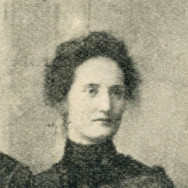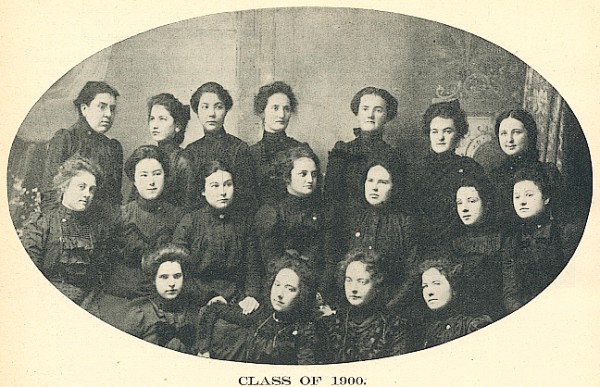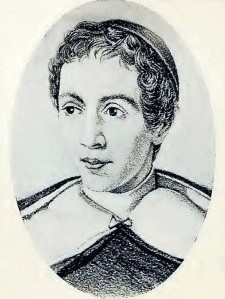“Influence of Noble Womanhood,” according to a Saint Clara girl in 1900
Posted in Saint Clara Academy

From the Saint Clara Academy, Sinsinawa magazine The Young Eagle, in 1900. I think she makes many good points.
“INFLUENCE OF NOBLE WOMANHOOD”
“A woman’s influence should be variously beautiful, wide, eloquent of truth and purity, and unselfish devotion.” And has it not always been so ? When we look at Eve as she is described after her fall in meek submission accepting her punishment, leading and encouraging Adam to persevere nobly and hopefully through the rugged road of repentance, which can alone bring them back to the home their sin had lost, we forgive and admire her. Sorrow widens her sympathy; her suffering is forgotten in unselfishness, and she becomes Adam’s support.
And we read of noble women whose virtues and tact have won more than countless swords before we come to the second Eve, who is the model type of womanly perfection. Surely we are proud to claim among our sex this—the fairest of God’s creatures !
We are told that ” in the early Christian ages whenever there was adversity, hard work, or danger, woman stood ready to meet it—Tabor could do without her, but Calvary claimed her as a right.” And when we think of her bearing silently the sword of bitter anguish at the foot of the cross, when perhaps one pleading look would have induced that Son who loved her so to change her suffering to the transports of celestial bliss, we do not wonder that her image and fortitude have been the inspiration of the most perfect writers.
Not only have Catholics paid her homage, for outside the pale of the church we find many passages singing her praises where there might seem small chance of finding sympathy. Thus Shelley speaks in admiration :
” Seraph of Heaven, too gentle to be human,
Veiling beneath that radiant form of woman
All that is insupportable in thee
Of light and love of immortality.
Sweet benediction in the eternal curse,
Veiled glory of this lampless universe.
Thou moon beyond the clouds ! Thou living form
Among the dead! Thou star above the storm!
Thou Wonder and thou Beauty and thou Terror!
Thou Harmony of Nature’s art ! Thou Mirror
In whom as in the splendor of the sun
All shapes look glorious which thou gazest on.”
We thank him, and love his memory for these beautiful words in honor of her who is the best of women. She is a friend to all. ” Our Lady of Liberty,” the captive cries. ” Our Lady of Sorrows,” moan the afflicted. ” Our Lady of the Cradle,” pray mothers. ” Our Lady of the People,” exclaim those who see in her the protector of labor. And each title has its own special consolation.
During the dark ages, the establishment of cloisters gave woman a separate, independent existence, while the nun in turn became the protector and teacher of mother and child. Many ambitious knights must have paused in wonder at the silent but strong influence and charity of ladies of noble birth giving their whole lives to the service of their weaker sisters.
The woman Dante describes, who influenced him so, was a true daughter of the church, and one that we all wish to be like. Her power over his life from their first meeting, when children of nine, to his death, is wonderful. She is like a light burning brightest in darkest hours, leading him ever upward. Her influence is silent but oh, so inspiring! She instills a love for the gentle and beautiful, the good and pure. How many of Dante’s readers has Beatrice also influenced ?
Good women were a great support in the past, but how much greater a part is woman’s at present ? Her circle is widened. She has taken an active part in the development of literature, art and music; while her virtues have become the purest ideals.
She can voice her opinions in public affairs if necessary; but her truest sphere is home. God made her its queen. From there her influence can be most widely distributed.
How many good resolves in the hour of temptation are due to the recollections of a mother whose soul was filled with the love of God; or a sister whose companionship taught other but long forgotten lessons ? There is a pause in the midst of the most daring crime or ambitious project, for at the thought of a pure face the noble nature conquers.
It must be true that ” the hand that rocks the cradle rules the world.” Woman influences, and for good or bad. When good, she can raise the soul to its noblest efforts ; when bad, she can drag her victims to the lowest degradation.
” To woman, born to dignify retreat
Unknown to flourish, and, unseen, be great.
To give domestic life its sweetest charm
With softest polish, and with virtue warm.
Fearful of fame, unwilling to be known
Should seek but heaven’s applauses and her own,
Should dread no blame but that which crimes impart,
The censures of a self condemning heart.”
And as we shall soon take part in the world, and, like the rest of our sex, have an active interest in it, our share should be worthy of the care which has been taken to teach us the noblest paths—those which lead to God. We trust that our whole lives will be worthy of our “Alma Mater” and Mother.
ANNIE O’SHEA, 1900. [ie, class of 1900]




